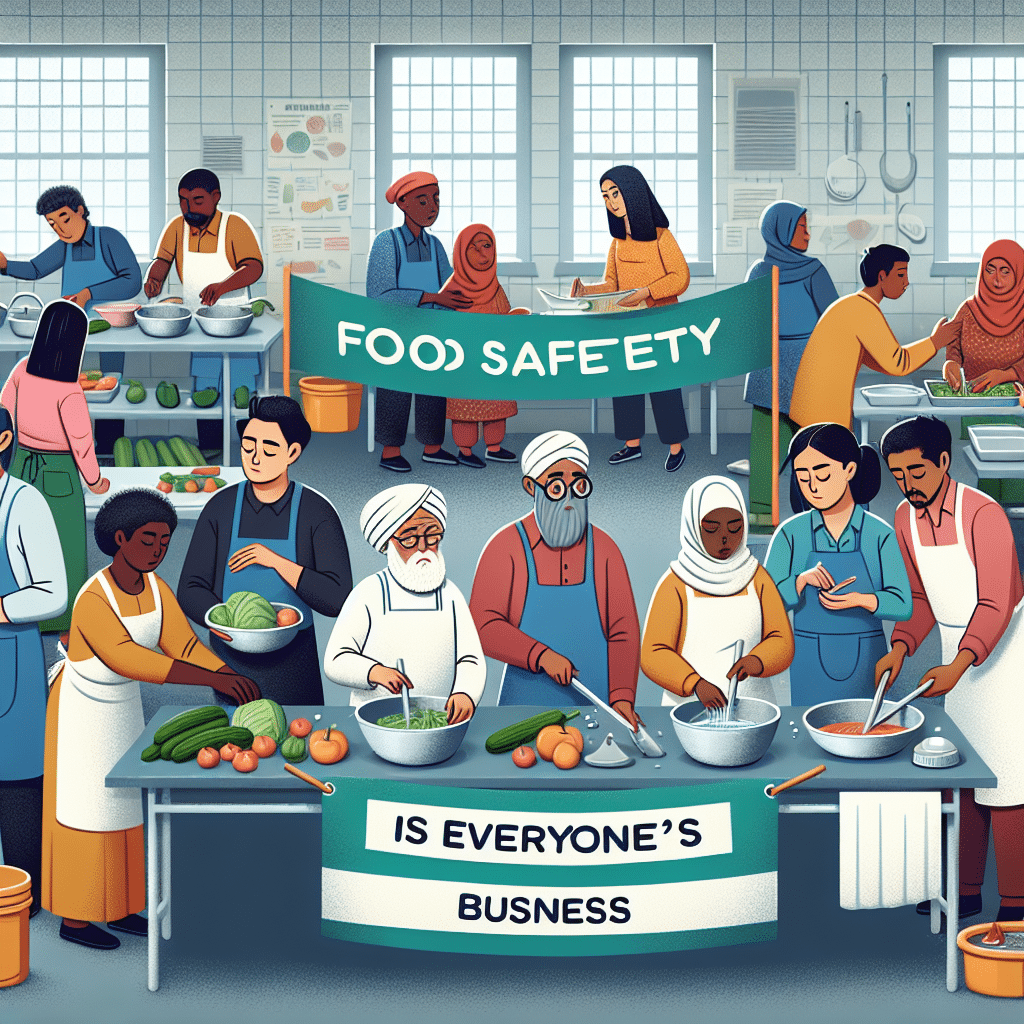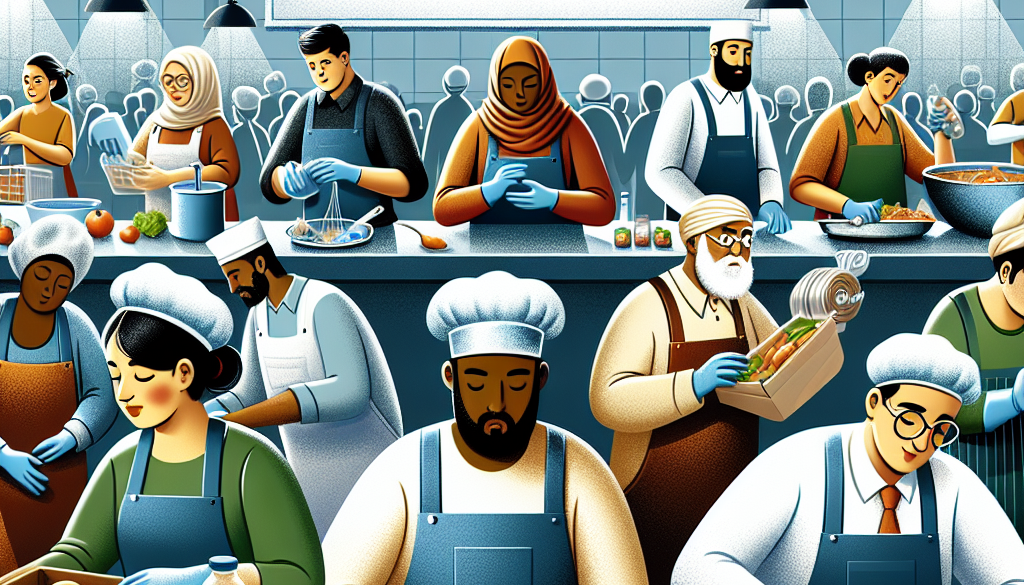Food Safety Is Everyones Business
-
Table of Contents
- Food Safety: A Critical Responsibility for All
- The Importance of Food Safety
- Risks and Consequences of Unsafe Food
- Ensuring Food Safety: A Shared Responsibility
- Preventive Measures and Best Practices
- Technological Advancements in Food Safety
- Global Initiatives and Collaboration
- Conclusion: Food Safety Is a Collective Endeavor
- ETprotein: Your Source for High-Quality Protein Products
Food Safety: A Critical Responsibility for All

Food safety is a fundamental aspect of public health that affects everyone from farm to fork. Ensuring the safety of our food is not just the responsibility of producers and regulators; it is a shared obligation that requires vigilance and participation from all stakeholders, including consumers. This article delves into the importance of food safety, the risks associated with foodborne illnesses, and the collective efforts required to maintain a safe food supply.
The Importance of Food Safety
Foodborne illnesses are a significant public health concern worldwide. According to the World Health Organization (WHO), an estimated 600 million people—almost 1 in 10 globally—fall ill after consuming contaminated food each year, resulting in 420,000 deaths. These statistics underscore the critical need for stringent food safety practices.
Food safety encompasses a range of practices aimed at preventing contamination and ensuring that food is safe to eat. This includes proper handling, storage, and preparation of food to avoid the proliferation of pathogens such as bacteria, viruses, parasites, and chemical substances.
Risks and Consequences of Unsafe Food
Consuming unsafe food can lead to a host of health issues, ranging from mild gastrointestinal discomfort to severe, life-threatening conditions. Some of the most common foodborne pathogens include Salmonella, E. coli, and Listeria, which can cause symptoms such as nausea, vomiting, diarrhea, and fever.
The consequences of foodborne illnesses are not limited to health impacts; they also have significant economic repercussions. The Centers for Disease Control and Prevention (CDC) estimates that foodborne diseases cost the United States approximately $15.6 billion each year. These costs arise from medical expenses, lost productivity, and the impact on the food industry.
Ensuring Food Safety: A Shared Responsibility
Food safety is a complex issue that requires cooperation and collaboration across the entire food supply chain. Here are some key players and their roles:
- Government and Regulatory Bodies: Establish and enforce food safety standards, conduct inspections, and manage foodborne illness outbreaks.
- Food Producers and Manufacturers: Implement good agricultural and manufacturing practices to minimize contamination risks.
- Retailers and Food Service Providers: Ensure that food is stored, handled, and prepared in ways that prevent contamination.
- Consumers: Practice safe food handling and preparation at home, and stay informed about food recalls and safety advisories.
Preventive Measures and Best Practices
Preventing foodborne illnesses involves a proactive approach to food safety. Here are some best practices that can be adopted by various stakeholders:
- At the Production Level: Implementing Hazard Analysis and Critical Control Points (HACCP) systems to identify and control potential hazards.
- In Transportation and Storage: Maintaining proper temperature control and protecting food from cross-contamination.
- At Retail and Restaurants: Training staff on food safety protocols and ensuring cleanliness and proper food handling.
- For Consumers: Washing hands and surfaces often, separating raw and cooked foods, cooking to the right temperature, and refrigerating promptly.
Technological Advancements in Food Safety
Technology plays a crucial role in enhancing food safety. Innovations such as blockchain for traceability, rapid pathogen detection methods, and smart packaging that monitors food conditions are transforming the industry. These technologies enable quicker responses to contamination incidents and provide greater transparency throughout the food supply chain.
Global Initiatives and Collaboration
International organizations such as the WHO and the Food and Agriculture Organization (FAO) work to promote food safety globally. They provide guidelines, support research, and facilitate collaboration among countries to strengthen food safety systems. The Codex Alimentarius, a collection of internationally recognized standards and guidelines, is a key resource for harmonizing food safety practices worldwide.
Conclusion: Food Safety Is a Collective Endeavor
Food safety is a critical issue that requires the concerted efforts of everyone involved in the food supply chain. From producers to consumers, each player has a role in ensuring that the food we eat is safe. By adopting best practices, leveraging technology, and collaborating on a global scale, we can minimize the risks of foodborne illnesses and protect public health.
As we continue to work towards a safer food system, it is also important to consider the nutritional quality of the foods we consume. Companies like ETprotein are dedicated to providing high-quality protein products that are not only safe but also contribute to a balanced diet.
ETprotein: Your Source for High-Quality Protein Products
ETprotein is a leading manufacturer and supplier of organic bulk vegan proteins and L-(+)-Ergothioneine (EGT). Their products, including Organic rice protein, pea protein, and various seed proteins, are characterized by a neutral taste, non-GMO, allergen-free attributes, and high purity levels. Catering to industries such as nutraceuticals, pharmaceuticals, and food and beverage, ETprotein ensures that their offerings meet the highest standards of food safety and nutrition.
If you are looking for reliable protein solutions for your products, consider ETprotein’s range of high-quality ingredients. Contact them at sales(at)ETprotein.com to learn more or to request samples.
About ETprotein:
ETprotein, a reputable protein and L-(+)-Ergothioneine (EGT) Chinese factory manufacturer and supplier, is renowned for producing, stocking, exporting, and delivering the highest quality organic bulk vegan proteins and L-(+)-Ergothioneine. They include Organic rice protein, clear rice protein, pea protein, clear pea protein, watermelon seed protein, pumpkin seed protein, sunflower seed protein, mung bean protein, peanut protein, and L-(+)-Ergothioneine EGT Pharmaceutical grade, L-(+)-Ergothioneine EGT food grade, L-(+)-Ergothioneine EGT cosmetic grade, L-(+)-Ergothioneine EGT reference grade and L-(+)-Ergothioneine EGT standard. Their offerings, characterized by a neutral taste, non-GMO, allergen-free attributes, with L-(+)-Ergothioneine purity over 98%, 99%, cater to a diverse range of industries. They serve nutraceutical, pharmaceutical, cosmeceutical, veterinary, as well as food and beverage finished product distributors, traders, and manufacturers across Europe, USA, Canada, Australia, Thailand, Japan, Korea, Brazil, and Chile, among others.
ETprotein specialization includes exporting and delivering tailor-made protein powder and finished nutritional supplements. Their extensive product range covers sectors like Food and Beverage, Sports Nutrition, Weight Management, Dietary Supplements, Health and Wellness Products, and Infant Formula, ensuring comprehensive solutions to meet all your protein needs.
As a trusted company by leading global food and beverage brands and Fortune 500 companies, ETprotein reinforces China’s reputation in the global arena. For more information or to sample their products, please contact them and email sales(at)ETprotein.com today.












